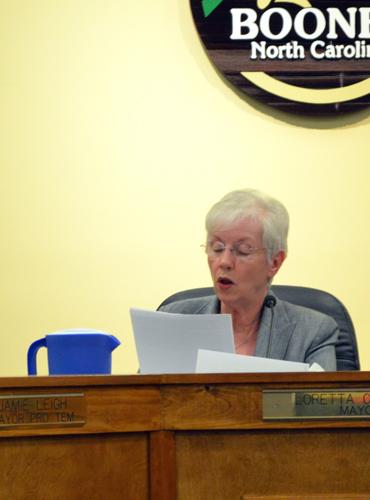
Watauga County commissioners voted 3-2 Tuesday night to change the sales tax distribution for the county, even though it was opposed by Boone Town Council.
The commissioners proposed the change after the town council approved the housing ordinances last month. These changes will not be official until May 1, so the town and county have time to come to an agreement.
The changes will go into effect July 1 if they are not changed before the May 1 deadline.
The new sales tax distribution will be ad valorem. This method favors areas that pay more in property taxes, according to the Watauga Democrat. The current method used is called the per capita method, which benefits areas with larger populations.
If implemented, the Town of Boone will lose $2 million in revenue. This cut will make it more difficult for the town to provide services to residents of Boone, according to a statement released by the town council.
During 2008-09, two-thirds of the sales tax in Watauga County came from Boone, according to the statement.
Boone receives 25 percent of the revenue from the sale taxes with the current distribution method. If the new method is implemented, Boone would only receive 12 percent of the revenue, according to the statement.
Thirty-two percent of Boone property does not pay taxes because it is either a government entity or a non-profit, including Appalachian State University. But these organizations still use the services provided by taxes such as police, the fire department and snow removal, according to the statement.
During a town council meeting April 16, the council asked for mediation between them and the county commissioners in a closed session.
The county commissioners rejected the invitation, according to the statement.
The county commissioners said the meeting would be a violation of North Carolina’s open records law, but the town cited a 2006 N.C. Court of Appeals case between Asheville and Buncombe County that said if a lawsuit was threatened, there could be mediation in a closed session.
Commissioner Chairman Nathan Miller threatened a lawsuit against the town in the Watauga Democrat, according to the statement.
“We are very disappointed that the Watauga County Commissioners rejected our invitation to participate in a mediation to try to resolve the county’s threat to sue the Town of Boone to challenge the recently enacted ordinance, which was designed to increase housing opportunities for moderate-income people in Boone,” according to the statement.
The town said that a compromise could easily be reached, so long as the county wanted to reach one as well.
“If the county commission majority actually wanted to reach a compromise that met the legitimate goals of both entities, it could easily have done so without resorting to threats and actions explicitly stated by Commissioner Miller as intended to ‘penalize’ the town,” according to the statement. “The town is still open to reaching such a solution.”
The town said they will reconsider allowing other municipalities to use the second water intake project Boone is currently funding and allowing the long-term leases of county recreational programs if the tax redistribution goes into effect.
Story and Photo: CHELSEY FISHER, Managing Editor

